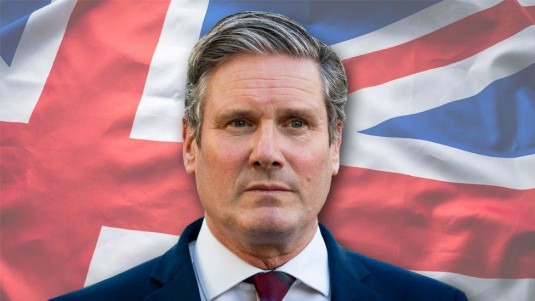
Anyone hoping for eye-catching policy were to be disappointed. The theme Starmer went biggest on was security (something I can't complain about seeing as this blog urged the last two Labour leaders to do the same). One part of this pitch was to the law and order crowd. Giving it a leftish spin, he said crime is a "social justice issue", and said he'd want more police on the beat and new local powers for coppers to bust drug dens. Given the well-documented issues the police have with institutional racism, I can't see that being misused at all. More usefully, security was expanded to include securing the NHS - a positive message as the Tories have used Covid to run the health service into the ground. And pleasingly, he reiterated Labour's commitment to workers' rights from day one of employment.
There was the usual Starmer boilerplate, as expected. Tory levelling up failures were referenced, and gestures towards a putative Labour modernisation programme (transform Humberside into a Hydrogen hub!) were made. He talked about patriotism again, and how the party was patriotic because it wanted to fix the country's problems, not simply moan about them. And then onto sounding like a Cultural Studies textbook from 20 years ago, he talked about the importance of place and how the nation helps give our lives meaning. He talked up the record of Labour's winners - Attlee, Wilson, and Blair, and how each of them had left Britain a better place than they found it. And to get the wonks excited, he re-announced the constitutional commission set up under Gordon Brown that's going to look at how the UK is run.
Not a lot of meat, and barely any gravy. Challenged by the assembled hacks about policy, he said this speech was about values. And that's true enough, apart from criticising the Tories and teasing what his government would look like, this has been consistent in pretty much all his set-piece addresses. The idea is straight forward: show Labour isn't an alien from Planet Bolshevik, because the leadership have imbibed the totally contrived notion that there's something inauthentic and anti-British about the party. Only then will the irredeemably conservative and small n nationalist British working class vote for them. This begs a second question: with the Labour hosted live stream topping out at only 434 people, who is the audience for this stuff? Certainly not the public, who had better things to do on a Tuesday morning. Nor the activists, even if they're fully paid up members of the Starmer project.
Going heavily on values instead of policy means the press and broadcast hacks have little to talk about except how Starmer thinks Johnson's not up to the job, and how patriotic the party is. When he did talk policy - the crime stuff, protecting the NHS, workers' rights - few are going to be opposed to that sort of thing, or at the very least it's not going to cause him political pain. Similarly, his invocation of Labour leaders past was vague but purposeful - they were paraded as winners, backed by vague plaudits about their positive legacies. Asked about Tony Blair's knighthood on Good Morning Britain, rather than plunge into detail he neutrally linked it to past public service rendered. This speech and the images it calls into being is not the articulation of a thought out political position but to establish vibes about Labour and its leader, an inchoate structure of feeling left deliberately vague at the moment to inculcate positive feelings of seriousness and good faith on the part of the public.
This also explains how Starmer handled some of the questions coming from the hacks. On the charge Labour hasn't announced policies, he pointed to the plethora of relatively small scale and marginal positions the party has taken up. Following the Ed Miliband play book, two years in he's still not minded to announce anything eye-catching. Invited to compare himself to Jeremy Corbyn, he ignored the question completely. And on the pledges he made during the leadership election but have since been abandoned, he said he still stood by them. Knowing it was unlikely to get picked up by the media, he felt a straight up lie would help him out of that tight spot.
Following his Prime Minister's impression, the LOTO team, the faithful, and Starmer himself will be quite satisfied with today's speech - even if he temporarily forgot his third value was 'respect'. The problem, however, is the lack of love shown the non-sticky base Labour has acquired and who must be kept on board ahead of the next election. If Starmer doesn't want to talk policy, he doesn't have to. Instead of vaguely talking about green manufacturing jobs, again designed specifically with the old working class in mind, he could genuflect towards their problems with property and renting, pay and aspirations, vocational and graduate opportunities, retraining and education. It's not difficult, and it's hardly going to get the backs up of the imagined voters he's presently targeting. "I for one cannot vote Labour any longer because Keir Starmer wants to pay my grandchildren properly" is not a difficulty the party is about to encounter.
In sum, there was little here we haven't heard already. Labour is patriotic, very British, and absolutely on your side. But the avoidance of engaging with the interests of the base Labour consolidated in 2017 and 2019 is looking less than an oversight and more of a pattern of behaviour, and it's a refusal that will cost him, his leadership, and the party down the line. Unless it's acted upon.
Image Credit
1 comment:
Are security and prosperity values? Security against what, prosperity for whom, and what form does this prosperity take?
Isn’t respect earned?
“Things absolutely no one anywhere can be against.”
How can anyone, anywhere be for something so ill defined?
Post a Comment